Java final exam - Study guides, Class notes & Summaries
Looking for the best study guides, study notes and summaries about Java final exam? On this page you'll find 316 study documents about Java final exam.
Page 4 out of 316 results
Sort by
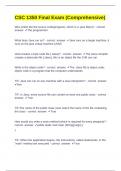
-
CSC 1350 Final Exam Question and answers rated A+ 2024
- Exam (elaborations) • 120 pages • 2024
- Available in package deal
-
- $14.49
- + learn more
CSC 1350 Final Exam Question and answers rated A+ 2024 CSC 1350 Final Exam (Comprehensive) Who writes the the source code(program), which is a .java file(s)? - correct answer The programmer What does Java run on? - correct answer Java runs on a target machine, it runs on the java virtual machine (JVM) what creates a byte code file (.class)? - correct answer The Java compiler creates a bytecode file (.class), this is an object file the JVM can run What is the object code? - co...
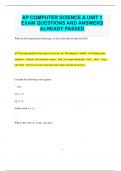
-
AP COMPUTER SCIENCE A UNIT 1 EXAM QUESTIONS AND ANSWERS ALREADY PASSED
- Exam (elaborations) • 9 pages • 2024
- Available in package deal
-
- $9.99
- + learn more
AP COMPUTER SCIENCE A UNIT 1 EXAM QUESTIONS AND ANSWERS ALREADY PASSED What are the main primitive data types in Java, and what are they used for? The main primitive data types in Java are `int` (for integers), `double` (for floating-point numbers), `boolean` (for true/false values), `char` (for single characters), `byte`, `short`, `long`, and `float`. These are used to store basic data values directly in memory. Consider the following code segment: ```java int x = 5; int y = ...
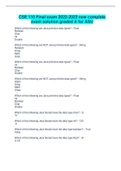
-
CSE 110 Final exam 2022-2023 new complete exam solution graded A for ASU
- Exam (elaborations) • 10 pages • 2022
- Available in package deal
-
- $8.49
- 1x sold
- + learn more
CSE 110 Final exam 2022-2023 new complete exam solution graded A for ASU Which of the following are Java primitive data types? - Float Boolean Char Int Double Which of the following are NOT Java primitive data types? - String Random Array Math class Which of the following are Java primitive data types? - Float Int Boolean Char Double Which of the following are NOT Java primitive data types?
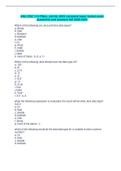
-
ASU CSE 110 FINAL (JAVA) 2023 complete basic tested exam questions and answers fall 2022-2023
- Exam (elaborations) • 8 pages • 2022
- Available in package deal
-
- $10.99
- 1x sold
- + learn more
ASU CSE 110 FINAL (JAVA) 2023 complete basic tested exam questions and answers fall 2022-2023
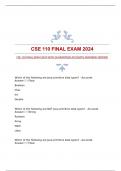
-
CSE 110 FINAL EXAM 2024 WITH GUARANTEED ACCURATE ANSWERS|VERIFIED
- Exam (elaborations) • 17 pages • 2024
- Available in package deal
-
- $13.99
- + learn more
CSE 110 FINAL EXAM 2024 CSE 110 FINAL EXAM 2024 WITH GUARANTEED ACCURATE ANSWERS|VERIFIED Which of the following are Java primitive data types? - Accurate AnswerFloat Boolean Char Int Double Which of the following are NOT Java primitive data types? - Accurate AnswerString Random Array Math class Which of the following are Java primitive data types? - Accurate AnswerFloat Int Boolean Char Double Which of the following are NOT Java primitive data types? - Accurate Answ...
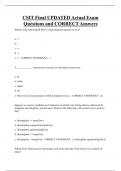
-
CSIT Final UPDATED Actual Exam Questions and CORRECT Answers
- Exam (elaborations) • 34 pages • 2024
- Available in package deal
-
- $9.99
- + learn more
CSIT Final UPDATED Actual Exam Questions and CORRECT Answers Which of the following IS NOT a valid relational operator in Java? a. <= b. > c. == d. <> e. != - CORRECT ANSWER- <> A _____________ loop always executes its loop body at least once
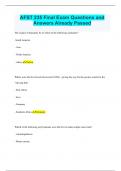
-
AFST 235 Final Exam Questions and Answers Already Passed
- Exam (elaborations) • 29 pages • 2024
- Available in package deal
-
- $9.99
- + learn more
AFST 235 Final Exam Questions and Answers Already Passed The origins of humanity lie in which of the following continents? -South America - Asia - North America - Africa Africa Where were the first fossils discovered (1856) - paving the way for the greater search for the "missing link" - East Africa - Java - Germany - Southern Africa Germany Which of the following early humans were the first to make simple stone tools? - Australopithecus - Homo erectus - Homo habilis - "Piltdown M...
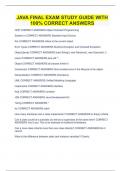
-
JAVA Bundled Exams Questions And Correct Answers |100% Correct
- Package deal • 9 items • 2024
-
- $27.99
- + learn more
Java Final Exam Questions With Correct Answers |Guaranteed Success Java Final Exam Multiple Choice With 100% Correct Answers Java Final Exam Questions And Complete Solutions |Verified Java Final Exam Questions And Complete Solutions |Guaranteed Success
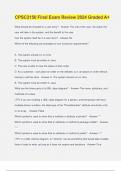
-
CPSC2150 Final Exam Review 2024 Graded A+
- Exam (elaborations) • 59 pages • 2024
-
- $13.49
- + learn more
CPSC2150 Final Exam Review 2024 Graded A+ What should be included in a user story? - Answer-The role of the user, the action the user will take in the system, and the benefit to the user Can the system itself be in a user story? - Answer-No Which of the following are examples of non-functional requirements? A. The system should run on Unix B. The system must be written in Java C. The user is able to view the status of their order D. As a customer, I can place an order on the website, so ...
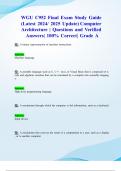
-
WGU C952 Final Exam Study Guide (Latest 2024/ 2025 Update) Computer Architecture | Questions and Verified Answers| 100% Correct| Grade A
- Exam (elaborations) • 74 pages • 2024
- Available in package deal
-
- $11.49
- + learn more
WGU C952 Final Exam Study Guide (Latest 2024/ 2025 Update) Computer Architecture | Questions and Verified Answers| 100% Correct| Grade A Q: A binary representation of machine instructions Answer: Machine language Q: A portable language such as C, C++, Java, or Visual Basic that is composed of words and algebraic notation that can be translated by a compiler into assembly language. Answer: High-level programming language Q: A mechanism through which the computer is fe...

$6.50 for your textbook summary multiplied by 100 fellow students... Do the math: that's a lot of money! Don't be a thief of your own wallet and start uploading yours now. Discover all about earning on Stuvia


